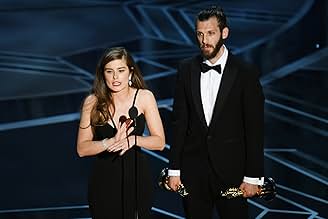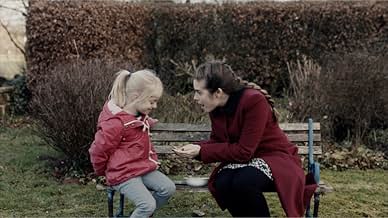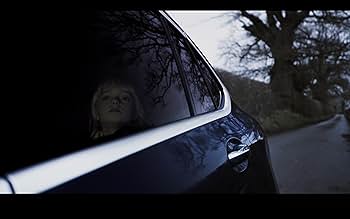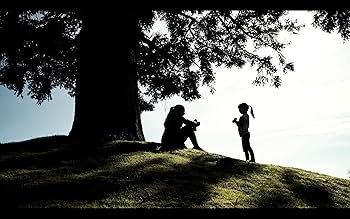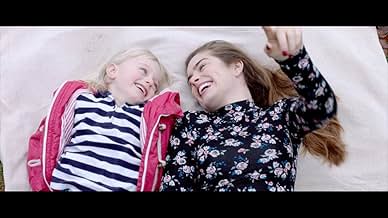NOTE IMDb
7,7/10
3,1 k
MA NOTE
Ajouter une intrigue dans votre langueA deaf 6-year-old girl named Libby lives in a world of silence until a caring social worker teaches her to use sign language to communicate.A deaf 6-year-old girl named Libby lives in a world of silence until a caring social worker teaches her to use sign language to communicate.A deaf 6-year-old girl named Libby lives in a world of silence until a caring social worker teaches her to use sign language to communicate.
- Réalisation
- Scénario
- Casting principal
- Récompensé par 1 Oscar
- 25 victoires et 8 nominations au total
Avis à la une
How often do you sit down and watch something, agree it's fundamentally incredible say it deserves to win an Oscar and it never does. Fortunately for this superb presentation justice has been served. The film itself is sensitive, thought provoking, and genuinely gives you a reasoned insight into what life must be like for Libby, the frustrations and struggles, but also the truth that the human spirit seems able to overcome anything. A heart breaking watch for most of us, but such an important message shared. Young Maisie Sly is absolutely incredible, how proud must her loved ones be of her. Wonderful.
"The Silent Child," Chris Overton, Rachel Shenton - A beautiful film with an important message about how deaf children need support and assistance in life and in school in order to develop fully to their potential, and the serious negative consequences that lack of support can have. I found this film to be quite touching. Beautifully directed, acting was phenomenal. Rachel Shenton should be a star. This is my personal pick for the live-action short film Oscar.
'THE SILENT CHILD': Four Stars (Out of Five)
A 20-minute short film about a four-year-old deaf girl, who's assigned a social worker to help her learn sign language, but her skeptical parents are highly resistant to it. This short was directed by Chris Overton and written by Rachel Senton. It's well made, but it's also quite depressing and frustrating at times too. The film deals with some annoyingly bigoted parents, that you learn to really dislike throughout the short (or at least I did). I also learned to really care for the young deaf girl though. It's well made and insightful too.
A 20-minute short film about a four-year-old deaf girl, who's assigned a social worker to help her learn sign language, but her skeptical parents are highly resistant to it. This short was directed by Chris Overton and written by Rachel Senton. It's well made, but it's also quite depressing and frustrating at times too. The film deals with some annoyingly bigoted parents, that you learn to really dislike throughout the short (or at least I did). I also learned to really care for the young deaf girl though. It's well made and insightful too.
Greetings again from the darkness. Few things are more disheartening and frustrating than seeing a child neglected by their parents. When that child is deaf or hearing-impaired, the actions of such parents cross over to infuriating. Such is the topic of this gut-wrenching short film from writer Rachel Shenton and director Chris Overton.
While we usually assume parents are focused on the best interests of the child, this expertly crafted film shows us just how easy it is for everyday life to impact our best intentions. Four year old Libby (Maisie Sly) is the youngest child in a typically busy home. Work, school and activities keep the others swarming around her - leaving young Libby in an isolated state of confusion. Libby is profoundly deaf, unable to communicate with her family, and rarely even interacts. Her mother (played by Rachel Fielding) is the on-the-go type who wants her daughter to be normal, and absent-mindedly yells "Bye Libby" as she heads out for her next errand.
When social worker/tutor Joanne (writer Shenton) is hired to prepare Libby for school, it isn't long before the two are conversing through sign-language and young Libby comes alive ... playing in the park and asking for orange juice. It's a beautiful thing to watch unfold.
Early on, the film addresses that Libby "does not qualify" for a cochlear implant, which apparently was the last bit of effort her mother expended in trying to make her "normal". The film is beautifully shot and carries the strong message that with a bit of support, deaf children can be mainstreamed into schools - though I do wish some more attention had been given to cochlear implants. Ending with a couple of sobering statistics, it's refreshing to know that Ms. Shenton is an activist supporting the deaf community.
While we usually assume parents are focused on the best interests of the child, this expertly crafted film shows us just how easy it is for everyday life to impact our best intentions. Four year old Libby (Maisie Sly) is the youngest child in a typically busy home. Work, school and activities keep the others swarming around her - leaving young Libby in an isolated state of confusion. Libby is profoundly deaf, unable to communicate with her family, and rarely even interacts. Her mother (played by Rachel Fielding) is the on-the-go type who wants her daughter to be normal, and absent-mindedly yells "Bye Libby" as she heads out for her next errand.
When social worker/tutor Joanne (writer Shenton) is hired to prepare Libby for school, it isn't long before the two are conversing through sign-language and young Libby comes alive ... playing in the park and asking for orange juice. It's a beautiful thing to watch unfold.
Early on, the film addresses that Libby "does not qualify" for a cochlear implant, which apparently was the last bit of effort her mother expended in trying to make her "normal". The film is beautifully shot and carries the strong message that with a bit of support, deaf children can be mainstreamed into schools - though I do wish some more attention had been given to cochlear implants. Ending with a couple of sobering statistics, it's refreshing to know that Ms. Shenton is an activist supporting the deaf community.
Joanne (Rachel Shenton) is the new tutor for a young deaf girl named Libby. Her mother is concerned about her learning sign language and would rather have her lip-reading. This leads to a conflict with Joanne who starts teaching the girl sign language.
This is an Oscar winning short. It's actually a very compelling two thirds of a movie. Shenton and the little girl are amazing together. It's emotional and it has a message. This would make for a nice stepping stone to a full length movie.
This is an Oscar winning short. It's actually a very compelling two thirds of a movie. Shenton and the little girl are amazing together. It's emotional and it has a message. This would make for a nice stepping stone to a full length movie.
Le saviez-vous
- AnecdotesRachael Shenton signed along with her Academy Award acceptance speech (using British Sign Language BSL) after making a promise to her co-star Maisie Sly, that she would do so if they won.
- ConnexionsFeatured in The Oscar Nominated Short Films 2018: Live Action (2018)
Meilleurs choix
Connectez-vous pour évaluer et suivre la liste de favoris afin de recevoir des recommandations personnalisées
Détails
- Date de sortie
- Pays d’origine
- Sites officiels
- Langues
- Aussi connu sous le nom de
- La niña silenciosa
- Lieux de tournage
- Sociétés de production
- Voir plus de crédits d'entreprise sur IMDbPro
Box-office
- Budget
- 10 000 £GB (estimé)
- Durée20 minutes
- Couleur
- Rapport de forme
- 2.35 : 1
Contribuer à cette page
Suggérer une modification ou ajouter du contenu manquant

Lacune principale
By what name was The Silent Child (2017) officially released in Canada in English?
Répondre
